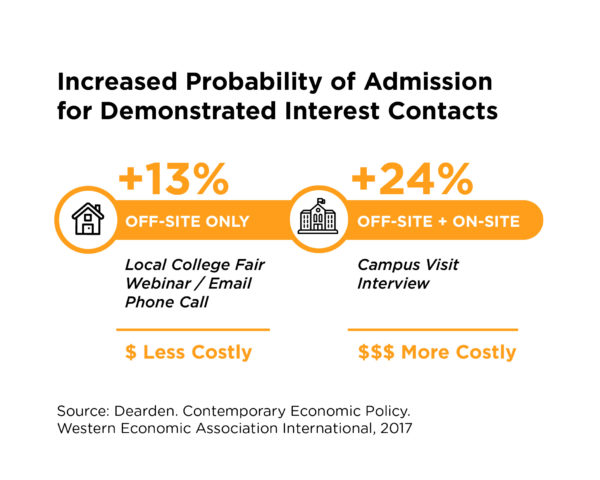Many colleges now consider demonstrated interest when choosing among applicants, but what is the impact on students from low-income families?
What is Demonstrated Interest?
Demonstrated interest refers to a group of metrics used by colleges to narrow their choice in applicants. By admitting students that ultimately enroll, colleges increase their yield, therefore making the school appear more selective and desirable.
For applicants, demonstrated interest has become a set of admissions activities that can give them a competitive edge. Applicants show demonstrated interest by making contact with the school, signaling that they are seriously interested in enrolling. These contacts can include going for campus visits, attending local college fairs, participating in online events such as webinars, calling or emailing admissions counselors, engaging on social media platforms, interviewing with school representatives, and more.
Colleges Favor Campus Visits Over Other Forms of Demonstrated Interest
A recent study conducted by three Lehigh University researchers and published in the journal Contemporary Economic Policy, found that colleges place greater emphasis on those contacts which cost more money and time. What’s more, on-site contacts such as college visits (those that tend to be more costly) increase the probability of admission significantly more than off-site contacts, such as those that can be initiated from an applicant’s home community or computer.

What’s the Impact on Students from Low-Income Families?
It’s no secret that college visits can be expensive, especially when the school of interest is out of state. Families must consider the cost of travel, accommodation and food, plus time off from work for accompanying parents. For low-income families, a campus visit can be financially out of reach, placing their students at a disadvantage in terms of demonstrated interest.
Professor James Dearden, lead researcher of the study cited above, states
“If achieving equity in college admissions is a goal, then our results point to the need for subsidizing costly signals of low-income students.”
Not all Colleges Consider Demonstrated Interest Important
Recognizing this disparity, some schools choose not to use demonstrated interest in their admissions criteria. According to CollegeVine, one of the reasons colleges choose not to use demonstrated interest is that it can be “unfair.” Author Gianna Cifredo states,
“One of the classic ways of demonstrating interest to a college is through a college visit, which can be expensive and therefore prohibitive to students from low-income families.”
A 2019 survey conducted by the National Association of College Admissions Counseling (NACAC) found that 32.1% of colleges ranked demonstrated interest of “No Importance”, an increase from 28.6% the previous year. On the other hand, the percentage of schools that ranked demonstrated interest of “Considerable Importance” climbed from 15.5% to 16.1%.
To get a better look at which programs are weighing demonstrated interest heavily in their admissions criteria, CollegeVine has published a list.
For Low-Income Students Applying to Schools that Weigh Demonstrated Interest, College Boarding Pass is Here to Help
Students from low-income families that cannot afford a campus visit should not feel limited in their search for the best-fit colleges. Some schools offer fly-in programs to level the playing field, allowing students from low-income and traditionally underserved communities to visit – but very few colleges that consider demonstrated interest offer these programs.
For academically qualified, low-income students, College Boarding Pass closes the gap by providing outreach and travel scholarships so they can demonstrate interest and learn if they are a good fit with their first choice school.



Leave A Comment